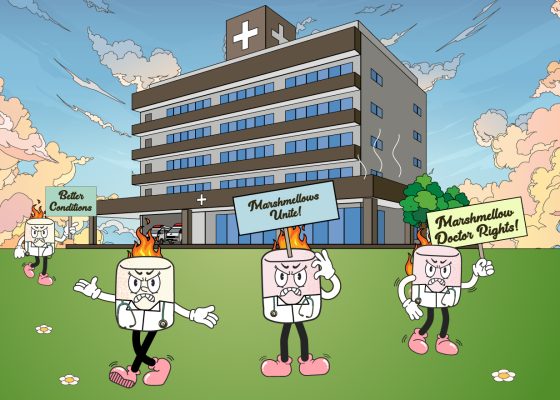Burnout rates in hospitals are still high, and young doctors are still being bullied.
Despite no “F grades” for the first time since 2015, a survey of junior hospital doctors in WA shows there are “still many areas of concern and plenty of room for improvement”.
Almost 1500 junior doctors were surveyed by AMA Western Australia for its annual Hospital Health Check.
“For the first time in the history of the HHC since its inception in 2015, there is not a single F grade to be found on this year’s HHC scorecard, with significant improvements in many areas underpinned by ongoing advocacy efforts and agreement negotiation,” the report says.
But “there are still many areas of concern and plenty of room for improvement”.
The survey compiled responses from junior doctors working for WA healthcare providers AHS, EMHS, NMHS, PathWest, SMHS, WACHS, WNHS, Ramsay and SJOG. Responses were expressed as a grade, where A+ was highest and F was a fail.
Things have been steadily improving since the “dismal” 2022 results on issues like overtime, leave access and roster reviews, and reporting mechanisms for bullying, discrimination and sexual harassment, the report said.
And the WA Health System – Medical Practitioners – AMA Agreement 2024 (WA Health Agreement), that 86% of members voted in favour of, came into operation in November last year, resulted in many improvements.
The best 2025 results were for morale and culture (As and Bs) and access to leave (Bs, As and a couple of A+s for NMHS and SJOG). And all the employers got at least a B as a recommendation to others seeking employment; two of them (NMHS and SJOG) scored an A+.
Adequate teaching and training got As, Bs and Cs. There was improvement in this area, compared to “alarmingly poor scores overall in 2023”, the report said. But it was also noted that over a third of respondents said the process of applying for training had affected their wellbeing.
Terms, rosters and workloads scored Bs and Cs.
“This category unfortunately sees the most significant decline in results overall across the board this year compared to 2024. Only WNHS have improved their overall grade to a C (from a D grade in 2024),” the report said.
Related
A couple of responses highlighted could give a clue as to why:
“Weekend on calls for some specialties are just mad. I received over 150 calls a few weekends back. Non-stop. … To be honest, it’s not a safe working environment for patients or staff”
“Being awake and giving phone advice all night for $12 an hour and being expected to work all of the next day is not appropriate.”
In addition, 41% of respondents said they spent two to four hours on administrative tasks in an average shift, with little point in trying to get help from IT or other resources.
Also of note, only 49% of respondents felt their job was safe if they took parental leave. This was actually an improvement on last year, but “in today’s day and age no one should feel concerned that they may not have a job to return to if they take parental leave”, the report said.
Wellbeing (burnout) results were low – Cs, Ds and one B (for SJOG). Workplace entitlements and flexibility only received Cs and Ds, but it was the most improved category after getting mainly Fs in 2023 and 2024.
While 91% of respondents said they “often or always [feel] safe at work”, 30% experienced bullying, sexual harassment or discrimination and 34% said they were afraid of the consequences of reporting it.
“Acknowledging that some employers [CAHS, SJOG, SMHS and Ramsay] have improved their results in these areas this year, while some employers [PathWest and WACHS] have scored significantly worse, there has been a general increase in prevalence of these behaviours across the health system in the past 12 months,” the report said.
“[I]t is encouraging to see some notable improvement in the results this year for whether a DiT feels able to speak up on workplace issues (without fear of retribution) after the majority of Employers’ (with the exception of Ramsay) scores worsened in this area last year. PathWest has improved the most with a score of 50% compared to last year’s score of 25%, though this result is still concerningly low compared to all other Employers.”
Many IMG respondents (65%) said they “felt very or quite well supported” and 89% said they had received orientation on commencement, but other feedback showed it was still a concern, “with many respondents specifically highlighting key areas such as PBS prescribing, Medicare, CPD Homes, and Public vs Private Patient treatment and billing requiring more thorough training on commencement,” the report said.
“Concerns were also noted regarding IMGs being placed in rural hospitals immediately without first undertaking placement, including adequate orientation, in metro tertiary hospitals.”
The IMG respondents were also nearly twice as likely as other respondents to report experiencing discrimination.
“As we do every year, we have written to each employer with a copy of this report, inviting them to respond in the June-July edition of Medicus to their results and the areas of concern highlighted, and also offered to meet with Chief and Medical Executive to discuss the results in more detail”, the report said.
The respondents were mainly interns and RMOs (61%), female (61%) and aged 26-30 (41%). Over 300 were IMGs. Almost all respondents ticked either Australian (37%), Asian (30%) or European (22%) when asked about ethnic background. A wide range of specialties were represented, though 10.4% preferred not to specify to which they belonged. The largest numbers were in adult medicine (physician) (22.6%), surgery (13.3%), emergency medicine (12.4%) and paediatrics and child health (8.7%).




